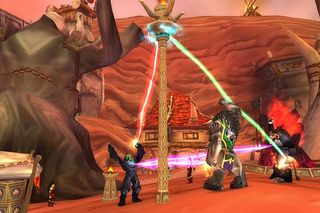PC game publishers try to ward off pirates via CD copyright protection (usually reduced to putty in a matter of days) and many gamers argue that Digital Rights Management is the reason they download illegal content in the first place. "I'm against copy protection schemes because they're bad business. They discourage people from buying PC games," complains a blogger called Draignol.
Aside from "giving it to the man," why do gamers break the law? Some complain about awkward PC game installation, others say they're sick of spending their hard-earned on crappy titles. Garry, of Garry's Mod fame, offers a few theories: "Downloading is easier than going to a shop or waiting for a game to be delivered. This is the same with Day Zero stuff (when a game is finished and in replication, but not yet available to consumers).
"For example, I had S.T.A.L.K.E.R. on pre-order from Amazon for about two months, but about three days before it was delivered it'd already been pirated, so I downloaded the pirate version and played it. I feel perfectly justified because I'd already bought it. Another group is kids. Kids don't have money and they can't really buy off Steam because they need a credit card or PayPal."
Ah, Steam. Love it or want to mutilate it slowly, Valve's digital condom has re-written the rulebook for PC game protection. Although Half-Life 2 experienced an early network break, Steam successfully shielded the finished product from thieving itinerants. Doug Lombardi recalls: "When Half-Life 2 was released, it was the only major release of that holiday season (on any platform) that did not experience Day Zero piracy. Pre-ordering and preloading on Steam means that you can get a game the instant it's released. Now the pirates lose out by not buying."

Above:When an early version of World of Warcraft leaked onto the Internet, some do-gooders were far from impressed. "I was incredibly pissed," ranted one MMO junkie. "If any of my friends said they'd downloaded the leak, I'd have slapped them in the face."
